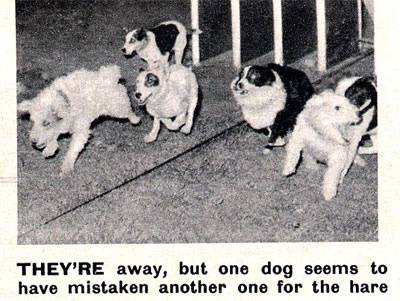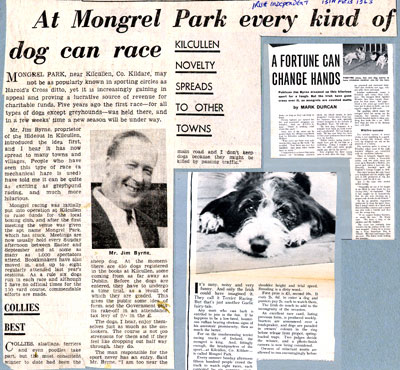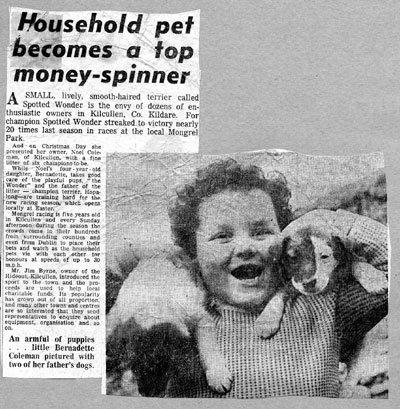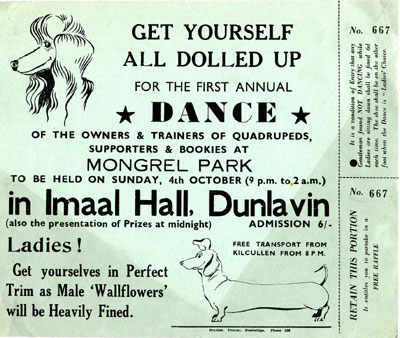It wasn't even in my dreams that it would be my back garden when, as a teenager, I used to keep that piece of grass in impeccable order, mowing it religiously every Wednesday and Saturday afternoon.
At the time it was part of a field. A field that 'grew' money, on Thursday nights and Sunday afternoons. Not literally, of course. But at those times of the week, quite amazing sums of money changed hands in 'Mongrel Park', home of terrier racing in Ireland.
It all began towards the end of the fifties, when the local amateur boxing club needed a premises of its own. For many years the club had trained in an upstairs store at the back of my Dad's pub. It wasn't really satisfactory because the ring had to be erected each training night, and there were no real facilities. Especially when it came to hosting visiting clubs for tournaments.
Dad was President of the club, and a national amateur boxing referee, as well as chief chauffeur when youngsters needed to be ferried around the country to tournaments. Despite the minimal facilities, the club performed very well, even producing an Olympics contender, Colm McCoy.
Early in the fifties, the club had come to national prominence because of the successful fundraising venture, held on two successive years, of the Donnelly and Cooper fight pageant. But now, with the sixties approaching and the club needing to get a place of its own if it was to properly be able to both train and host young boxers, some very significant funding had to be raised.
Even in the few years since the pageants, Ireland had become much more sophisticated. Raising that idea from the dead wasn't likely to gain the same level of support..
Dad owned a field. And, such did he love the amateur boxing movement and in particular the Kilcullen club, he volunteered to donate the acre-and-a-quarter as a site for a Boxing Hall.
That only left the problem of raising funds to build it.
Problem? No problem. Probably at some very late time in the night, in the smokey back room of the pub, an idea broke the traps.
Dog racing. No, not greyhound racing — terrier racing. Ordinary Joe mutts. Dogs of the people. ABG, anything but greyhounds.
A small idea that was to get legs. Literally.
In the initial barking enthusiasm, essentials were devised. The field which was to become the site was, handily, some one hundred and twenty yards long. A perfect, and straight, doggy sprint distance.

A set of traps, able to hold and release six dogs, was built by a local carpenter. A 'hare on the wire' was devised, essentially a bit of furry stuff on a wheel that could be pulled on a wire ahead of the released mutts by a hand-operated crank. A fence was built to keep the punters off the track proper.
Track? It was a fairly rough field, one fallow for years since my grandmother had given up rearing pigs and letting them root around in the grass. It needed a bit of work.
So it was cut, and rolled, and cut again. Repeat many times. Eventually it was fairly rut-free and safe enough for little mongrel legs to run fast up along it without tripping. Much, anyway.
As a teenager with sprouting strength, it was given to me to do the mowing of the track on a regular basis. It was a motor-mower, but not one that was self-propelled. From a fairly reluctant start, I came to be proud of how well I did my particular job.
But back to the races. Initially on a Sunday afternoon, with just a few local pooches, not always even belonging to the people who brought them, they turned into a national wonder.
There's no advance knowing, in any enterprise, whether it will really work. Or even if it does initially, whether it will have staying power. 'Mongrel Park', as it was quickly named — literally ran away with itself. From a couple of score people on a Sunday afternoon, pretty well all local, to several hundred to a meet, only took one summer season. Before the actual advent of the decade of flower power, the enterprise had already added an 'evening meet' on Thursdays.
Because at the time there was no such thing as Sunday horse racing, nationally-known on-course bookmakers had found themselves a handy source of extra punting, in a tiny village called Kilcullen.

Not for the first time, Dad used his innate PR skills to get national publicity for the operation. For the reporters it had almost every good story element — money and, in a sidewise way, religion, because it provided for gambling on a Sunday and that wasn't — in public at least — popular with the clergy. The third traditional surefire story element is sex, which in this case was the doggy kind when after a couple of years even mongrels were being bred locally for their bloodline stamina on the track.
Eventually, of course there was even corruption to speculate about. Anecdotally at least, dogs were doped, switched — one story reports a sudden shower of rain turning a black unknown into a recognised white champion — and even stolen. There were some true champions. Local man Noel Coleman's 'Spotted Wonder' became the pooch equivalent of Arkle over two seasons.

There was even an official form book developed by local saddler Tommy Wallace, who over a four-year period built his list from around forty dogs to nearly five hundred. Over the same period, the number of stray dogs in the region declined dramatically, as any found local 'madra' with four sound legs was likely to be appropriated for rigorous and very secret evaluation, with a view to making a quick coup on the track.
It became such a 'real' thing that there was even an annual dance for 'owners and trainers of quadrupeds, supporters and bookies', held in the Imaal Hall, Dunlavin.

Success breeds success, and the concept was copied all over the country. At one stage in the early sixties it was estimated that there were in excess of a dozen such mongrel tracks operating. None achieved the same level of publicity or respect as the original. But, because they increased the interest in the sport more widely, it meant that new competition was being produced, and unknown dogs brought to new tracks made for even more interesting racing.
The press clippings that I have today are from as far away as some of America's most read columnists of the day, fascinated by the idea. I also recall the banner that was put across Kilcullen during the visit of Princess Grace of Monaco to Ireland — 'Mongrel Park Welcomes the Raniers'. The Prince and Princess weren't actually visiting the dog races, of course, but they were scheduled to pass under the banner that day on their way to visit a stud farm. I still wonder what they wondered, if they actually saw the banner?
At its height of success, Mongrel Park suddenly closed down. The reason was typically Irish, involving personality clashes within the Boxing Hall Committee. At that point, the hall walls themselves had already been raised almost to eaves level. But suddenly there was a 'split', and the Boxing Club moved itself out of the operation and the hall site.
We don't need to resurrect the reasons here, as time and attrition to the graveyard have made them irrelevant. But there were a couple of long-term results. The Boxing Club eventually built itself a hall at the bottom end of the town, in a site that today is potentially worth many millions as the modern Kilcullen develops.
For my part, if the original idea had gone ahead, my house today wouldn't be where I have lived since I got married. The first built in a line of five whose connected back gardens were actually the run of the track that started a national craze.
There was an unexpected personal epilogue. About a dozen years ago I was having lunch with the head of a university for whom I published their magazine. The conversation came around to where I was from. I told him.
My host beamed. "Kilcullen. Ah, I know it well."
"How so?"
"There used to be dog racing there."
"There was. My Dad was the man who got it going."
My host shook his head and smiled at the once again small world. "My mother had a dog, a terrier. As a young student, I used to take it out on Sundays, and I'd bring it down to Kilcullen to race it."
Of course, his mother didn't know. He said she wouldn't, most definitely would not, have been happy with the notion.
"And she didn't know," he smiled ruefully, "until one Sunday the damn dog won the big race of the day. There was a photographer there from the Irish Independent, and the next morning there was a photograph ..."
That's just one of the stories, as I look at the back garden that just now sorely needs mowing, which makes the job still able to cause a smile.
Sometimes as I push the machine along, I can still hear a chorus of yapping as the traps are opened and the very singular metallic whirr of the 'hare on the wire' races up the field ...


No comments:
Post a Comment